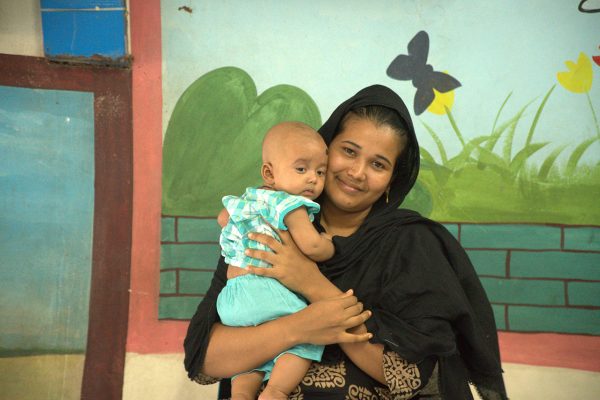Reading Time: 4 minutes
Imagine a small world. A world devoid of the harsh tales about unfortunate children – children who are not deformed by the cruel grasps of polio – children who are protected from the malicious glares of debilitating illness – children who are healthy and thriving.
Imagine a small world. A world devoid of the harsh tales about unfortunate children – children who are not deformed by the cruel grasps of polio – children who are protected from the malicious glares of debilitating illness – children who are healthy and thriving. Imagining a world like that might have been something like daydreaming even in the recent past, but the world is changing. People are changing, and in the course of that, positive changes are being made. Now, immunising children from incapacitating diseases, followed by disabilities and death is very much possible by means of vaccination.
This year, World Immunisation Week is observed worldwide from 21-28 April with great perseverance and exhilaration, where vaccinating children against deadly diseases is performed across the globe. World Health Organisation, along with the countries around the world, ensure that the governments are putting their best efforts by providing necessary resources, guidance, and technical support in conducting the event. The weeklong activity performed worldwide puts specific actions, such as raising awareness on how immunisation saves lives, increasing vaccination coverage as a means of preventing disease outbreak, reaching underserved and marginalised communities, and emphasising on the benefits of immunisation, under limelight. Like every year, BRAC had also participated uncountable vaccinating campaigns across the country under the initiatives of Bangladesh government, providing access to immunisation to the vast infants and children population in the country.
Immunisation, being one of the most successful and fruitful health interventions in the world, helps prevent around 2 to 3 million deaths every year. Provided to people of all age groups, especially infants and children, immunisation prevents debilitating illness, disability and death from the diseases such as diphtheria, hepatitis A and B, measles, mumps, pneumococcal disease, polio, rotavirus diarrhoea, tetanus and yellow fever that can easily be avoided by the use of vaccines. Adolescents and adults are also receiving their regular doses of vaccines, being provided with the protection against life-threatening diseases such as influenza, meningitis, and cancers (e.g. cervical and liver cancers) that occur in adulthood.
However, some diseases like diphtheria, measles, and polio were thought to be almost eradicated, and hence many parents and health professionals found the immunisations against them to be no longer necessary. This perception had caused numerous gaps in vaccination coverage in certain parts of the world, which resulted in those diseases to make a comeback, which is most likely to affect everyone if any outbreak occurs.
Manzima Akhter, 5, is the youngest of three daughters in her family. Her elder sister, Muhaimina, is a 15-year-old girl suffering from disability caused by polio. Living in a secluded village in the farthest corner of Bangladesh, their village had no access to vaccination. But thanks to the NID campaign, BRAC, Bangladesh government, and the GAVI Alliance, as Manzima and hundreds of other children in her village are getting access to vaccination. Even in those of the farthest and secluded most parts of Bangladesh, little children, curious and wide-eyed, marched towards the vaccination camps accompanied by their parents/guardians since early morning, and it is that moment when it is realised that people’s perceptions towards the idea of immunisation by means of vaccination has changed, and they have finally started believing in it. BRAC’s shasthya shebikas have worked relentlessly since years in bridging the gap between the health care services and the people, and finally their work is being paid off as this has actually helped change their perception towards vaccination.
This year, the country has made a significant investment for the health of its children by completing the rounds of National Immunisation Days (NID) properly. During this year’s NIDs (first round in January 7 and second round in February 11), Civil Society Organizations (CSOs)/ NGOs like BRAC, with the collaboration of Bangladesh government , has performed outstandingly in vaccinating a huge population of infants and children across the country. Hundreds of thousands of field workers and volunteers worked endlessly to vaccinate millions of children in the camps, which included established health facilities and health centers, schools, and mobile sites like bus terminals, ferries and train stations.
During the NIDs, the infants and children received polio vaccines and vitamin-A capsules, and the enthusiastic turnouts of them and their parents exceeded all expectations as more than the estimated number of eager parents and children showed up and received their doses adequately. The BRAC field workers and volunteers were more than willing to serve them all those times, happily struggling to cope with the enormous number of children and their guardians.
Apart from the centers assisted by the BRAC Health Program workers along with the government and local volunteers, many medical officers who work at the Upazila Health Complexes and Union Health Centers were also ensuring the NID to be carried out efficiently. Nevertheless, the collective effort of the government and CSOs like BRAC has no doubt enabled this noble initiative to prosper.
BRAC is incredibly proud to be a part of the 20th NID 2012 that the country has observed with increased participation and awareness. The children, their parents and/or guardians, the government and non-government health providers, community health workers, students, teachers and above all the community people have made it possible along with BRAC teams collaborated with the Bangladesh government. . These unbeaten events proved it again that the Bangladeshi people have realised the essentiality of vaccines and immunisation and they have effectively utilised the opportunity given to them. This NID will not only be protecting the children from Polio and night blindness through the administration of vaccines and Vitamin-A, but also happens to be an indication of how much Bangladesh cares to save the nation’s future.






